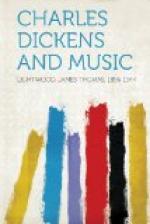he was generally known among the gentlemen as Bailey Junior, a name bestowed upon him in contradistinction perhaps to Old Bailey, and possibly as involving the recollection of an unfortunate lady of the same name, who perished by her own hand early in life and has been immortalized in a ballad.
The song referred to here is ‘Unfortunate Miss Bailey,’ by George Colman, and sung by Mr. Mathews in the comic opera of Love Laughs at Locksmiths. It tells the story of a maid who hung herself, while her persecutor took to drinking ratafia.
Dickens often refers to these old song-books, either under real or imaginary names. Captain Cuttle gives ’Stanfell’s Budget’ as the authority for one of his songs, and this was probably the song-book that formed one of the ornaments which he placed in the room he was preparing for Florence Dombey. Other common titles are the ‘Prentice’s Warbler,’ which Simon Tappertit used, ‘Fairburn’s Comic Songster,’ and the ’Little Warbler,’ which is mentioned two or three times. Of the songs belonging to this second period, some are embedded in ballad operas and plays, popular enough in their day, but long since forgotten. An example is Mr. Jingle’s quotation when he tells the blushing Rachel that he is going
In hurry, post haste for a
licence,
In hurry, ding
dong I come back,
though he omitted the last two lines:
For that you shan’t
need bid me twice hence,
I’ll be
here and there in a crack.
This verse is sung by Lord Grizzle in Fielding’s Tom Thumb, as arranged by Kane O’Hara.
Paul and Virginia is mentioned by Mrs. Flora Finching (L.D.) as being one of the things that ought to have been returned to Arthur Clennam when their engagement was broken off. This was a ballad opera by Reeve and Mazzinghi, and the opening number is the popular duet ‘See from ocean rising,’ concerning which there is a humorous passage in ’The Steam Excursion’ (S.B.), where it is sung by one of the Miss Tauntons and Captain Helves. The last-named, ’after a great deal of preparatory crowing and humming,’ began
in that grunting tone in which a man gets down, heaven knows where, without the remotest chance of ever getting up again. This in private circles is frequently designated a ‘bass voice.’
[Figure 1]




